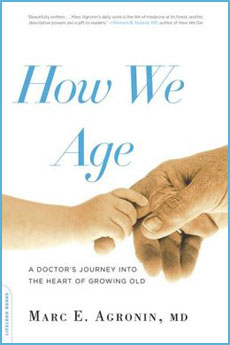Marc Agronin is a board-certified adult and geriatric psychiatrist currently serving as the Medical Director for Mental Health and Research at Miami Jewish Health System. His articles have appeared in The New York Times and many other publications. Agronin winces at the rampant examples of what Robert Butler called "ageism" in America where the negative side of growing old — decline, loss, illness, and death — is emphasized. This is abetted by a multi-billion dollar industry which has grown by leaps and bounds by peddling anti-aging products and clinics. People want to look younger, and so the quest for the Fountain of Youth continues. In this enlightening book, Agronin sets out to offer a more balanced perspective on growing old. He writes:
"We imagine the pains of late-life ailments but not the joys of new pursuits; we recoil at the losses and loneliness and fail to embrace the wisdom and meaning that only age can bring."
Attending a seminar on Erik Erikson's eight stages of the human life cycle, Agronin is pleased to see the emphasis on balance in late life, which itself is a form of wisdom. The author sheds some light on the resistance to life by one of his patients who reminds him of Bartleby, a character in a famous short story by Herman Melville.
Other elderly people he has worked with provide him with insights into memory, empathy, vitality, and independence. Gene Cohen exposes the myth of cerebral decline in all elders and posits that the brain can resculpt itself in later life. The same writer suggests that older men and women develop a "social portfolio" which contains all their past assets along with new ventures which bring deep gratification and meaning.
Many religious teachers have emphasized the positive side of aging. Abraham Joshua Heschel, the great Jewish sage, is quoted as saying that this stage of life is "rich in possibilities to unlearn the follies of a lifetime, to see through inbred self deceptions, to deepen understanding and compassion, to widen the horizon of honesty, to refine the sense of fairness."
As more and more people head toward living for 100 years, others are felled by what Agronin calls the "Four Horsemen of Old Age" — depression, dementia, delirium, and destitution. Every elder is given a chance to feast at the great table of life and then to rise up in hope for another day's gift of breath.
